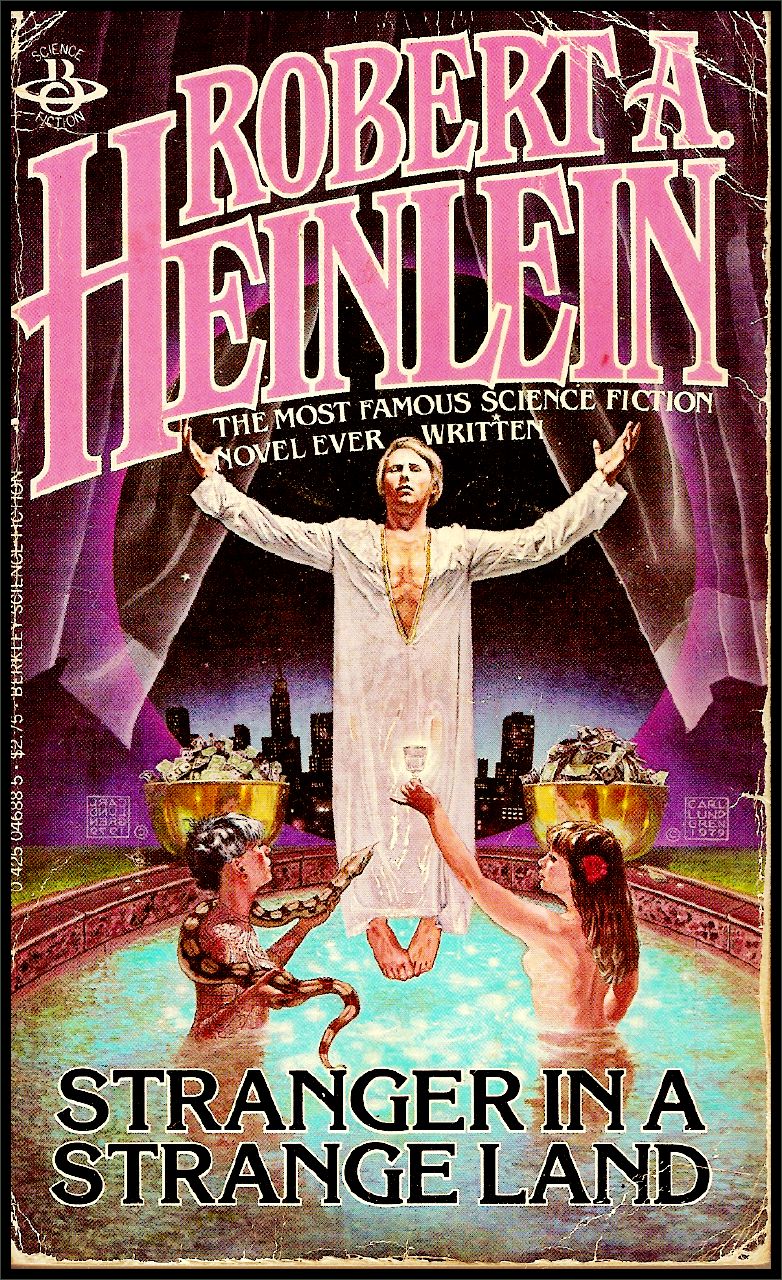Stranger in a Strange Land, Robert Heinline
Score: 5
Spoilers? Yeah.
(but the book is 56 years old, so who cares)
Be sure to check out my Scoring Scale to see what the score means.
Heinline is a legend. No one could take that from him, and I’m just a guy who listens to (scifi) books in my car, so he wins. With that said, I didn’t really like this book. One of the important things to remember is that my rating is subjective - really subjective. I’m basically just putting my reactions out there, and this book didn’t do much for me. The only reason why it was worth reading was to get a glimpse of what people were thinking in the late 50’s early 60’s. And for that, it was fascinating. For one thing, that time period is a bit of a no-man’s land for me. I’m not huge into American history, so I know WWII was going on in the early 40’s, and the mid-late 60’s was all about hippies and Civil Rights. But between those? I guess that’s where you get Heinline.
For that, there are some things that you just have to choose to stomach if you want to read this book. For one, it’s hopelessly sexist. As I was first reading it, I though, “Oh, Jill has a bit of spine, that’s good to see.” But as I read on, I realized that as soon as the plot was ready to make a man the main protagonist, Jill (and every other woman in the story) took a back seat as spunky, perky ornamentation for the scenes while the men did the talking. The sexism was rampant as far as only valuing the women for their physical features, but it was most upsetting that whenever the men were talking, the women just weren’t interested. They had no need for silly things like ideas.
Another thing you’d just need to stomach is that this book is written from the perspective of an upper-class white man. All others need not exist. That’s kind of what you get when you read Heinline. He uses science fiction as a medium to talk politics or philosophy, but he tends to do it sort of as a soap box. It’s kind of why I love Heinline: he’s a true science fiction writer. He takes a concept or fear and extrapolates it into an imaginary world. Ultimately, the conflict and plot in his stories are secondary to the dialogues that explain the ideas of interest. In this particular treaties, he’s interested in religion as a social power structure. I could imagine how that could have been an interesting concept at the time - the problem is that his take on that is that of a (probably) wealthy white man. Social power structures and the assumptions behind them are very different to people of different walks of life.

Those two problems are enough for me to want to give the book a low score and make it a “don’t bother recommendation”, that’s really not the whole picture. While I didn’t like those things, I can recognize that, for his time, he was trying to give women more respect than they got in other stories. I’ve only read a little bit from the 50’s and it’s not much different. Also, he’s giving women full sexual freedom, which I’m sure was a revolutionary idea at the time.
In reality, the main reason I didn’t care for the book was because I wasn’t particularly interested in his topic of choice. In Seattle 2017, religion as a social power structure isn’t particularly valid topic. I am an ordained minister. I have been through bible school at one of the most reputable religious universities in the region, I got a masters degree from Princeton Theological Seminary, and have worked as a protestant minister in churches since 2010 - and not once have I seen religious hold any significant social power over anyone. In the places I’ve lived, religion is just grasping at anything it can to get a seat at the table of social discourse. That’s why so many religious people become so angry and fanatically conservative: they want some proof that their beliefs, traditions, and habits actually matter.
That’s a harsh critique of religion, and I’m a very religious person. I’ve got all kinds of ideas about why those things have happened, how to fix them, and all that. But, 1) that’s not what this blog is about, and 2) none of those ideas paid the bills, so I’ve moved on to paying gigs since…hence the whole working in Seattle and having the long commute that precipitated this blog.
I am explaining that to say that, in the 56 years since this book has been written, a lot has changed. For one, the Renaissance Man, Jubal Harshaw would probably have been imprisoned as a sex offender. For another, Valentine Michael Smith’s radical philosophy wouldn’t be that looked down on today in many circles. His free love commune could find safe haven somewhere in most countries, if not most cities in the United States. For that reason, the central conflict of the Stranger in a Strange Land simply don’t apply today.
With that in mind, there are a few things that I did like or learn from the book:
To Grok or not to Grok
I actually decided to read this book because a friend of mine at work mentioned how this book invented a word that has made it into the common vernacular. I didn’t know what she was talking about, but I later heard a data scientist podacst where someone used the word “grok” to explain some of the concepts a data scientist should probably master if they hope to excel in the field. I looked up where the word came to, and decided, why not give it a try.
Grok means to understand a thing in it’s fullest. To get it to your bones. Like a part of who you are. In fact, that’s one of the main concepts of the book: that all things are one, and recognition of that fact brings a type of freedom transcends any other law. Anyone who can truly “grok” will become an Uberman, though everything groks whether they realize it or not. That concept sounds like a lot of what I read in seminary and I’d had enough of those debates in my early twenties. It felt like Heinline was just rehashing arguments I used to have outside my apartment, but he was doing it alone and fantasizing about sex at the same time. I wasn’t impressed. Though I really like the word and I now use it.
Picturing an Uberman
I read this book and then decided to finally watch the movie Lucy, with Scarlet Johansen. It was weird because her character followed a pretty similar arch to Michael in the story. Her ability to see and know everything reminded me a lot of him. And the concept that “if we only awakened our inner potential, we’d be Gods!” is central to A Stranger in A Strange Land. It made me wonder whether that thread or belief is an influence of this book. I’m not sure, but from now on, there’s no way I’m going to be able to hear that nonsense without thinking of Michael Valentine Smith, the Man from Mars.
Money is a thing
One of the great untapped areas of interest in this book was the role of money. In one of the (creepy) old covers, you can actually see the bowls of money in that are ever present in Michaels nest homes. Heinline quickly creates a conflict in his book where, due to various legal statues that had formed prior to Michaels birth, he qualified as the sole ruler and monarch of Mars, therefore inheriting a vast amount of wealth. This turned out to be preposterous because Mars was already owned by Martians, but the money had to belong to someone, so Michael got it. Since Michael comes from a Martian society with no money, the concept of money makes no sense to him and he has to struggle to learn it. Eventually, his disciples become absolute mavens at making money because of their Ubermensch powers.
At one point Michael explains that, unlike the Martians, money will always exist on earth. Even in a society that has no need of it, there will always be a need because people will want things. It is a somewhat preposterous idea, but it does say something about the world at the time: Heinline, for all of his imagination, could not imagine a world where communal living ultimately rules the day. Money exists, even if it serves no purpose to him. This point is telling to me because it proves itself: money is so powerful that you simply can’t get rid of it, even in Heinline’s science fiction.
Conclusions
The book is a classic, and for that reason, people should read it. I just can’t imagine anyone who isn’t like me bothering. With that said, the point of this whole blog is to give recommendations to other people who are stuck in their commutes way more than they should be. For that reason, if you made it through Starship Troopers (which I really liked), or if - for some reason - you’re interested in the interplay between religion, money, and government as agents of social power…then go ahead and read A Stranger in a Strange Land.
